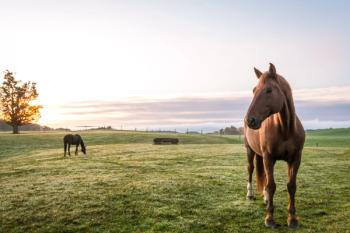
Veterinary school recovers after Virginia Tech shooting rampage
Blacksburg, Va. - While almost 400 Virginia-Maryland Regional College of Veterinary Medicine (VMRCVM) students attended classes and labs the morning of April 16, the start of a massacre was underway just 500 yards across campus.
BLACKSBURG, VA. — While almost 400 Virginia-Maryland Regional College of Veterinary Medicine (VMRCVM) students attended classes and labs the morning of April 16, the start of a massacre was underway just 500 yards across campus.
Mourning the losses of faculty members and friends, Virginia Tech is forever changed, says one veterinary school spokesperson.
"This has been a terrible gash in our collective psyche. People are just ripped apart by the horror of this, and it is going to take time," says VMRCVM spokesperson Jeffrey Douglas of what has been called the deadliest school massacre in U.S. history. No veterinary students were killed or injured in the rampage.
"Even at the end of the healing period, we will never be the same. Maybe we'll be stronger. I don't know. But we can never be the same again," he says. The veterinary college administration was first apprised of the unfolding campus situation shortly after the shooting at West Ambler Johnston Hall — a residence hall 500 yards from the college — that left two students dead, Douglas says. The shooter later was identified as 23-year-old senior English major Cho Seung-Hui.
Relying on informal communication and later campus-wide e-mails, VMRCVM Dean Gerhardt G. Schuring decided to place the college building under lockdown, which at the time was filled with about 400 of the veterinary school's nearly 460 students.
"We locked all the doors, but we did keep the teaching hospital doors open briefly because we had clients coming in and out. We sent everyone home around noon, and basically closed for the week," Douglas says.
The college has about 360 students in the veterinary-medicine program — approximately 90 in each graduating class. About 100 more students are enrolled in the master's and PhD programs in veterinary or biomedical sciences.
When classes resumed April 23, all VT students were given three options for completing the semester, which ends in mid-May: have their work graded on materials submitted before April 16; on materials already submitted, plus any other materials the student wishes to submit for a grade; or, all the material that would have been submitted for a grade upon regular completion of the course, according to a statement released by university Provost Mark McNamee.
The veterinary school will offer the same options to first-, second- and third-year students. Fourth-year students are encouraged to continue as normal. "We are a professional school with a medical-school curriculum that is training medical practitioners. Our fourth-year class members are expected to complete their work as they would have in the absence of such a horrible tragedy," says Douglas, citing accreditation, clinical certification and licensing issues that all must ensure clinical competency.
He says the administration is prepared to deal with serious issues on a case-by-case basis, however.
The university also is offering counseling for all students and faculty.
The veterinary school dealt with deadly violence once before, when a veterinary teaching hospital administrator was killed on-site by a mentally disturbed employee about 20 years ago, says Douglas, who found the victim after the attack. "So we've always taken security very seriously here," he says.
Even before the shootings, the school had spent several months looking at ways to enhance security. "We are in the midst of a process that will create a more restrictive, yet thankfully more secure environment," Douglas says. That involves installing new electronic locks and developing a badge-based employee and student recognition system, among other actions.
But along with the rest of campus, the veterinary school continues to reel and tries to recover from the violence. "We're as shocked as the entire university community," Douglas says.
Newsletter
From exam room tips to practice management insights, get trusted veterinary news delivered straight to your inbox—subscribe to dvm360.




